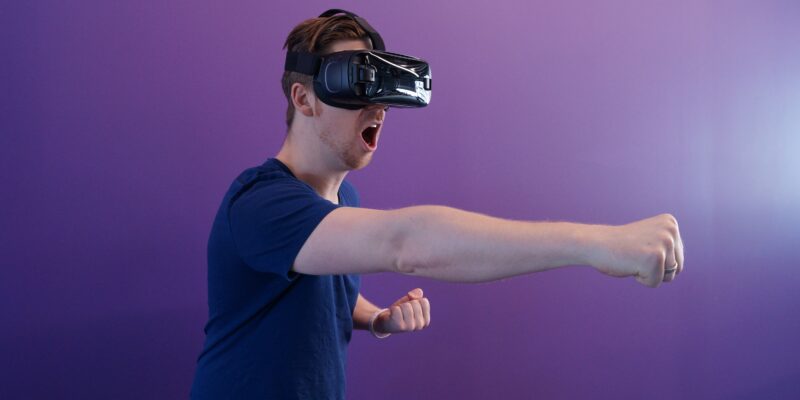As technology continues to advance at an unprecedented pace, we’re seeing more and more applications for virtual reality (VR) in entertainment. Perhaps one of the most exciting areas for VR development is entertainment. The potential for immersive experiences that make us feel like we’re really inside a game, movie or show is tantalizing, and there are already some impressive examples of VR entertainment out there. But what does the future hold for this technology? In this article, we’ll take a look at some of the developments in VR entertainment and where we might be headed.
The Current State of Virtual Reality Entertainment
Before we get into speculation about the future, let’s take a look at the state of VR entertainment today. There are already a variety of different VR products on the market, from high-end gaming systems like the Oculus Rift and HTC Vive to more accessible options like Google’s Daydream View and Samsung’s Gear VR. These devices offer different levels of immersion and interactivity, but they all share the common goal of making the viewer feel as though they’re really there, inside the content.
So far, VR entertainment offerings have largely been in the focus of gaming. The aforementioned gaming systems are all designed to offer immersive gaming experiences, and there are already a handful of popular VR games out there. Some notable examples include Beat Saber, a rhythm game where you slice through blocks with lightsabers, and Superhot VR, a first-person shooter where time moves only when you do.
Beyond gaming, there have also been some interesting VR entertainment experiments. For example, the VR experiences created by VOID, a company that’s developing physical VR “playgrounds,” have received a lot of attention. These experiences let you move around in a physical space that’s map onto a virtual environment. So far, the VOID has created VR experiences based on popular franchises like Ghostbusters, Star Wars, and Wreck-It Ralph.
There have also been some VR films and TV shows created, although these have yet to achieve mass popularity. One of the most high-profile examples is the Fox Innovation Lab’s The Martian VR Experience. It was released alongside the film adaptation of Andy Weir’s book. This experience lets you explore the Martian landscape as if you are the main character from the book. It is greatly well-known for its impressive visuals.
The Challenges Ahead
While there is already some impressive VR entertainment out there, there are also some significant challenges that need to be overcome before this technology can really take off. Perhaps the biggest of these is the issue of cost. High-end VR systems like the Oculus Rift and HTC Vive are still relatively expensive, and even the more accessible options like the Gear VR. They are limited by the power and storage of the phone they’re paired with. Plus, creating VR content is expensive and time-consuming, which can make it difficult to produce the kind of high-quality experiences that will really wow viewers.
Another challenge is the issue of motion sickness. This is a problem that can affect some people when they use VR systems, due to the disconnect between the visual cues of movement and the lack of physical movement. This can contribute to feelings of nausea, dizziness, or disorientation in some users. While this issue has been somewhat mitigated by improvements in VR technology, it’s still something that needs to be taken into account when creating VR experiences.
Finally, there’s the issue of content. While there are already some impressive virtual reality games and experiences in entertainment, there’s still relatively little content available. This is in part because creating VR content can be difficult and expensive, but it’s also because there’s still something of a chicken-and-egg problem when it comes to VR entertainment. Without a big audience, it’s hard for creators to justify investing in VR projects, but without more high-quality VR content, it’s hard to build that audience.
What’s Next?
Despite the challenges, it’s clear that there’s still plenty of interest in VR entertainment. The gaming industry in particular seems to be excited about the potential of VR, and there are plenty of big-name developers working on VR games as we speak.
However, one area that’s likely to see growth in the coming years is VR film and TV. While there are already some VR films and shows out there, this is an area that’s really just starting. As VR technology improves and becomes more accessible, we’re likely to see more and more experimentation in this space. We could see VR “episodes” of popular TV shows that let viewers explore different angles of a scene or immersive films that put viewers right in the middle of the action.
Another area that’s likely to see growth is location-base VR. We’ve already seen this with VOID’s VR experiences, but there are sure to be more companies coming up with similar offerings. These experiences offer a level of immersion that’s hard to achieve in a home setting, and they have the potential to be a big draw for theme parks and other entertainment venues.
Finally, it’s likely that we’ll see VR becoming more mainstream in the coming years. While there’s still a perception that VR is something for “hardcore gamers” or tech enthusiasts, this is likely to change as the technology becomes more accessible and more content becomes available. We could see VR headsets becoming as commonplace as smartphones within a decade or two, and the line between “augmented reality” and “virtual reality” could start to blur.
Conclusion
The future of virtual reality in entertainment is still somewhat uncertain. But one thing’s for sure: there’s a lot of potential here. There are plenty of ways that VR technology could change the way we consume entertainment. The challenges are significant, but with continued investment and experimentation, it’s likely that we’ll see VR becoming more mainstream in the coming years. It’s an exciting time to be watching this technology develop.











